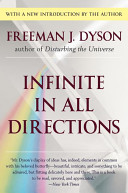Life Favors a Cold, Expanding Universe
If, on the other hand, we live in an open universe, infinite in space and time and continuing to expand into a future without end, then life has to face a prospect of slow freezing {111} rather than quick frying. The universe grows constantly colder as it expands, and the supply of free energy is constantly dwindling. To many people this future of endless ice has seemed even more dismal than the future of cataclysmic fire. But the laws of cosmic ecology put these futures into a very different perspective. If the hypothesis of adaptability is correct, life has a clear preference for ice over fire. In an expanding universe, life can adapt itself as the eons go by, constantly matching its metabolism of energy to the falling temperature of its surroundings. Since we are assuming perfect adaptability, the rate of energy metabolism falls with the square of the temperature. This has the consequence that, in an expanding universe, life of any fixed degree of complexity can survive forever upon a finite store of energy. The pulse of life will beat more slowly as the temperature falls but will never stop.
My theoretical physicist colleagues have recently found serious reasons to believe that all matter may be unstable. According to their latest theoretical models, the Grand Unified models of particle physics, the nuclei of all atoms will disappear into positrons and photons and neutrinos with a lifetime of the order of 1033 years. The reality of this universal decay of matter into radiation is now to be put to experimental test. Within a few years we should know for sure whether matter is permanent or transient. If the experiment decides that matter is transient, then life will have to face some severe problems about 1033 years from now. By human standards 1033 years is a long time, but in the eye of eternity it is but an instant. If the universe is open, the history of life will be only just beginning when the disappearance of matter threatens its existence.
This will be the supreme test of life's adaptability. I do not know whether we can survive without protons. But I do not see any reason even then to declare the situation hopeless. If the assumptions of abstraction and adaptability are correct, the patterns of life and consciousness should be transferable without loss from one medium to another. After the protons are gone, we shall still have electrons and positrons and photons, {112} and immaterial plasma may do as well as flesh and blood as a vehicle for the patterns of our thought. Perhaps the best possible universe is a universe of constant challenges, a universe in which survival is possible but not too easy. If optimism is the philosophy of people who welcome challenges, then we have plenty of reason to be optimists.
Notes:
Folksonomies: futurism adaptability anthropic anthropic principle
Taxonomies:
/science/physics (0.562047)
/science/social science/philosophy (0.293442)
/science/weather/meteorological disaster (0.231625)
Keywords:
life (0.944507 (positive:0.093703)), theoretical physicist colleagues (0.820631 (negative:-0.349687)), Grand Unified models (0.808977 (positive:0.217848)), best possible universe (0.805402 (neutral:0.000000)), latest theoretical models (0.804463 (positive:0.535274)), perfect adaptability (0.735328 (positive:0.487293)), matter (0.678337 (negative:-0.349687)), quick frying (0.675727 (negative:-0.559992)), open universe (0.673642 (neutral:0.000000)), slow freezing (0.667918 (negative:-0.559992)), free energy (0.658589 (negative:-0.357027)), endless ice (0.653428 (negative:-0.850628)), energy metabolism (0.644118 (negative:-0.332172)), different perspective (0.643309 (neutral:0.000000)), clear preference (0.642693 (positive:0.749243)), cosmic ecology (0.641748 (neutral:0.000000)), finite store (0.632064 (positive:0.302626)), immaterial plasma (0.630719 (negative:-0.549249)), fixed degree (0.629825 (positive:0.302626)), universal decay (0.627807 (neutral:0.000000)), particle physics (0.625352 (positive:0.217848)), severe problems (0.621050 (negative:-0.573170)), human standards (0.620768 (neutral:0.000000)), experimental test (0.619420 (neutral:0.000000)), supreme test (0.614318 (positive:0.582783)), long time (0.614155 (neutral:0.000000)), constant challenges (0.612934 (neutral:0.000000)), welcome challenges (0.610328 (positive:0.631015)), temperature (0.547582 (negative:-0.442143)), future (0.530694 (negative:-0.850628))
Entities:
physicist:JobTitle (0.682797 (negative:-0.349687)), 1033 years:Quantity (0.682797 (neutral:0.000000))
Concepts:
Physics (0.979571): dbpedia | freebase | opencyc
Atom (0.863547): dbpedia | freebase | opencyc
Time (0.765637): dbpedia | freebase | opencyc
General relativity (0.743150): dbpedia | freebase | opencyc
Particle physics (0.718996): dbpedia | freebase | opencyc
Energy (0.682927): dbpedia | freebase
Standard Model (0.679421): dbpedia | freebase | yago
Electron (0.649841): dbpedia | freebase | opencyc





